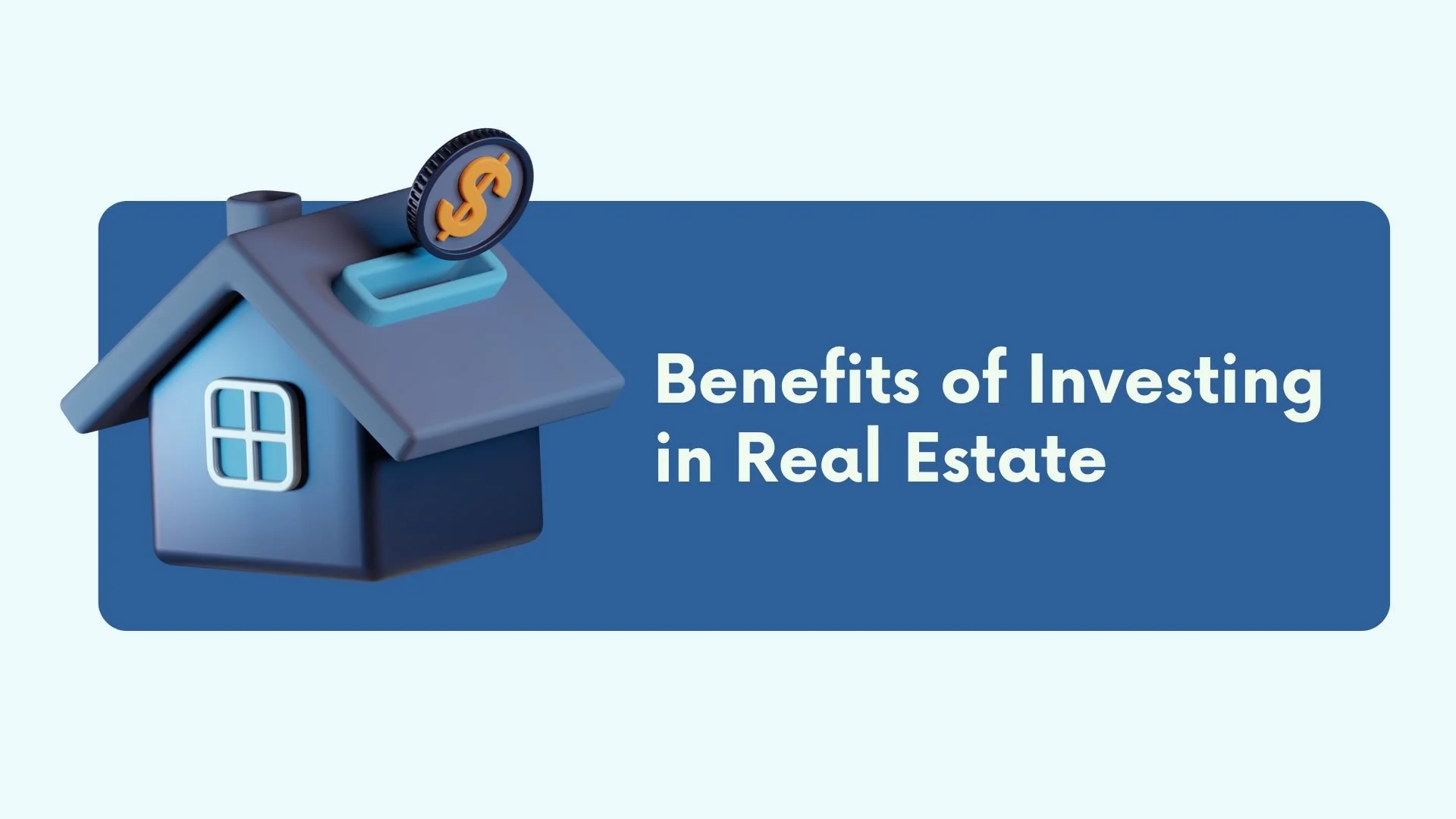Whether you’re aiming for portfolio diversification or generating financial security, real estate can help you reach your financial goals. There are many benefits of investing in real estate, and this article will guide you through the main ones.
1. Passive Income
The ability to generate passive income is one of the most common reasons investors choose real estate. Passive income can help you reach your financial goals faster or save more for retirement without having to work more hours in the week.
Whereas many real estate investing projects may require a good degree of work and capital upfront, once the repairs and renovations are complete and you have a tenant in place, you can sit back and enjoy the rental income. Adding real estate to your financial goals is a great way to obtain financial stability faster.
2. Long-Term Financial Security
Real estate investing also offers long-term financial security. Most real estate assets will appreciate over time through equity, which is the difference between what you owe on the property and its current market value. The real estate market will continue to increase, meaning your investment will hold its value well.
Many real estate investors also use an investment property to begin generating wealth. One of the top real estate benefits of investing is leaving your family with money, sometimes as much as tens of thousands of dollars.
The appreciated value of your investment property can also help your family build generational wealth. Keep the investment in the family and pass it on to your children or grandchildren so future generations can also enjoy the benefits of investing in real estate.
3. Protection From Inflation
Inflation is a common and expected occurrence, making it important to carefully choose investments that outpace it. Not all investments keep up with or outpace inflation, but with real estate investing, you can easily hedge against it. Inflation doesn’t typically affect real estate as much as other investment options. In fact, inflation will usually increase the value of real estate.
When compared to the stock market, real estate offers better protection against inflation. While mutual funds offer some degree of protection from inflation, real estate is typically a much better and safer strategy.
4. Tax Benefits
Another one of the biggest benefits of investing in real estate is the built-in tax benefits. The Internal Revenue Service (IRS) allows real estate investors to deduct costs related to their rental property.
Common tax deductions may include mortgage interest, repairs and renovations, depreciation, and any costs related to owning and managing a rental property. You can also write off any interest paid to secondary loans.
Costs like travel to and from the property, marketing fees, hiring a property management company, and closing costs are all eligible for tax breaks. The tax advantages of real estate can help you reduce your tax liability, helping you keep more of your hard-earned dollars in your pocket.
A real estate investor interested in investing in certain communities may also qualify for additional tax benefits through Opportunity Zones. These benefits allow you to reduce your taxable income while providing necessary housing to an in-need community.
5. Low-Risk Investment
Investing in real estate can be considered a low-risk, high-reward investment, especially if you’re willing to hold the asset for the long term. Real estate property tends to hold its value in a consistent market, making it one of your best options for generating a lot of returns without too much risk.
The ability to diversify your investment portfolio is also a common reason for real estate investing. Most financial experts recommend diversifying your investments across various options so you don’t lose everything if one area fails.
Diversification is even possible within real estate. For example, you might obtain a property for the purpose of rental income and offset it with a fix-and-flip of the property to generate immediate cash now.
Real estate investing also carries less risk than other investment types. When compared to the stock market, it tends to be less volatile, making it a low-risk investment.
6. Return on Investment
Real estate investing offers one of the best returns on investment (ROI), especially when compared to other investment strategies. The real estate market is reliable as people will always need somewhere to live.
Despite expected market fluctuations, you can usually expect home prices to level out, making it a good investment. Most real estate projects will eventually generate positive cash flow.
7. Value Appreciation
Property appreciation is the increase in an asset’s value over time. The market is expected, at a minimum, to maintain value. Yet, most properties will actually increase in value. This means you can hold properties for a short period and eventually sell them for more than the purchase price, earning high capital gains.
In most cases, the longer you hold the asset, the more appreciation real estate generates. Property values will continue to increase, and when combined with the opportunity to build equity, real estate is a physical asset that’s well worth the investment upfront.
8. Full Control Over Investment
Owning a real estate investment gives you full control over the asset, meaning you can be as much or as little involved as you want.
You could manage all aspects of your real estate investment, including finding tenants and managing repairs yourself. You could also enjoy the passive income potential of real estate investing by hiring a property management company to manage the day-to-day.
Of course, you also have control over the strategy. You could renovate a property to sell for fast profits or turn it into a long-term rental. Short-term vacation rentals are also an option in some tourist destinations. You have control over how profitable your investment is.
9. Effective Saving for Retirement
Real estate investing can be an effective strategy for saving for retirement. With the expected appreciation of your rental properties and any equity built, you can generate cash flow that gives you more funds in retirement.
You could also use the cash flow from your investment property to cover other life expenses, including college tuition or a child’s wedding. People who find it difficult to save money may prefer investing in physical assets like real estate.
10. Leverage in Real Estate Investments
Investing in a single investment property allows you to build capital and equity, which can help you acquire additional investment properties. As your real estate investment builds equity, you’ll eventually be able to cash it out and rely less and less on financing to acquire more projects.
Building and cashing out equity is also an important strategy in obtaining more expensive projects, like commercial properties, that may result in more gains. Showing proof of successful investments also boosts your buying power. Potential investors can acquire other investments through more purchasing power.
11. Easy to Finance
Most real estate investors will find it easy to finance their rental properties as long as they meet the lender’s requirements. Because the industry recognizes that real estate is a low-risk, high-reward investment, many lenders are willing to offer loans that support this strategy. The specific lending requirements will vary, though, depending on the lender.
Of course, choosing the right lender for your investment property is important to prevent fees from cutting into your cash flow.
Traditionally, investment property loans were more difficult to qualify for due to more stringent requirements or extremely high interest rates, but more recently, experienced investors are switching to specialized real estate loans to qualify on better terms.
Risks of Real Estate Investing
As with any investment, it’s important to understand not only the benefits of investing in real estate but also the risks. Here are some of the most common risks real estate investors deal with.
Initial Capital Requirements
As with any investment, you’ll need some money to make money with real estate. Most lenders require a downpayment to acquire an income property. You may also need to show proof of funds to manage the first few months of costs before you secure a renter.
The down payment may be one of the biggest hurdles for those interested in investing in real estate. The real estate industry offers many investment options, which makes it available to investors with different capital availability.
For example, a real estate investment trust (REIT) requires less upfront capital. However, real estate investment trusts also don’t typically pay as much as physical property.
Operating Expenses
Owning real estate comes with expenses. Investing in real estate requires maintenance and upkeep of your property. Most state and city laws require the property owner to pass inspections before renting out commercial or residential properties.
Expected operating expenses may include travel to and from the property, ongoing maintenance, unexpected repairs, and taxes. You’ll also have to cover carrying costs, including mortgage payments, utilities, and homeowners association (HOA) fees between tenants. If your goal is to fix and flip, you’ll also account for the real estate agent’s fees.
Problems With Renters
It’s also important to be prepared for potential problems with renters. Renters can cause extensive damage to your property, which can easily cut into your returns.
Evicting a non-paying tenant can also take time, and in the meantime, you’re responsible for making the monthly mortgage payments. Property managers and some real estate agents manage rentals, which can help you overcome this risk.
Main Types of Real Estate Investments
Before you start investing in real estate, reviewing the different investment types can be helpful in creating a successful plan. Investors have a few strategies available when it comes to property assets. These are some of the most common types of real estate investing:
Buy-and-Hold
With a buy-and-hold investment strategy, investors purchase a property, complete all necessary repairs, and then sit back and wait. Some investors may make the asset their primary residence, but most will rent it out to earn passive income.
Buy-and-hold assets earn through appreciation and equity. Experienced investors may try to time the market and sell later to boost their net worth.
The buy-and-hold method may also be used with commercial real estate. Instead of renting the property to residential tenants, the property is rented to long-term commercial business owners.
Vacation Rentals
Vacation rentals are similar to buy-and-hold in that investors purchase the asset to hold on to it for the long term. However, instead of renting the property to long-term residents, it’s offered to short-term renters on vacation. Vacation rentals can offer significant gains through higher rental prices but may require more in maintenance and upkeep expenses.
Fix-and-Flip
A fix-and-flip investment strategy involves purchasing a property to make repairs and sell. Also known as house flipping, investors plan to hold on to a fix-and-flip property for a much shorter period of time. Fix-and-flip investing may require more upfront costs but generate more returns in a shorter period.
A debt-service coverage ratio (DSCR) loan is an excellent option for fixing and flipping properties. DSCR loans have a lower down payment and less strict income and capital requirements, making it easier to qualify. (Check out our DSCR Calculator to see your DSCR in seconds.)
How to Finance a Real Estate Investment
Many investors rely on financing to start investing, whether you choose a residential or commercial rental. You have a few great financing options available when it comes to investing in real estate. A few lending options may include hard money, conventional, home equity cash out, or DSCR loans.
Some loans may even help you cover expenses, including necessary repairs or renovations, to generate additional monthly income from the property. Visio Lending even offers loans that factor in the expected income from the property rather than your current income. Explore your options or contact a lender today to purchase your first investment.
Is real estate a liquid investment?
Investing in real estate is not a liquid strategy. While the potential for capital gains and positive cash flow are excellent reasons to invest in real estate, you typically can’t quickly sell your asset for cash. Unlike your stocks or a mutual fund, you can’t cash out your assets in a few days.
Which real estate is best for real estate investors?
The best real estate to invest in depends on your available opportunities and financial goals. Buy-and-hold properties provide consistent cash flow, but fix-and-flip properties allow you to cash out a large payment at once. Regardless of which strategy you choose, most experts agree that real estate is the best asset class for reliable returns.
Where is the highest ROI on real estate?
The highest return on investment (ROI) in real estate is in highly populated cities or tourist destinations. This fluctuates, but currently, you can expect to earn high returns in Youngstown, Ohio; Phoenix, Arizona; Indianapolis, Indiana; and Birmingham, Alabama.
Is investing in real estate a good way to make money?
Yes, investing in real estate can be a great way to make money through rental cash flow or a fast return on investment. Real estate investing can be profitable as long as you do your research and choose the best lender.
Why is investing in real estate better than stocks?
Investing in real estate is one of the many investment strategies available. There is value in investing in both the stock market and real estate for diversification purposes, and real estate investing offers a few benefits over traditional investments.
Specifically, investors can earn capital appreciation through the stock market, but usually to a smaller degree. Additionally, investors don’t have as much control over the earnings of stocks or mutual funds.
Real estate investing offers passive income, appreciation, and easy financing. A real estate portfolio can also help investors leverage other investment types, helping them achieve financial success.






